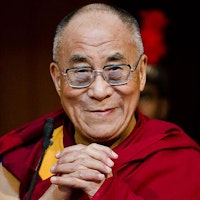This is my simple religion. There is no need for temples; no need for complicated philosophy. Our own brain, our own heart is our temple; the philosophy is kindness.
The Dalai Lama

My Simple Religion
Topic: Serving Others
Whether one believes in a religion or not, and whether one believes in rebirth or not, there isn’t anyone who doesn’t appreciate kindness and compassion.
Foolish selfish people are always thinking of themselves, and the result is negative. Wise selfish people think of others, help others as much as they can, and the result is that they too receive benefit.
This is my simple religion. There is no need for temples; no need for complicated philosophy. Our own brain, our own heart is our temple; the philosophy is kindness.
Tenzin Gyatso, born on July 6, 1935, is known globally as the 14th Dalai Lama, the spiritual and former political leader of the Tibetan people. Born as Lhamo Thondup in a farming family in Taktser, Amdo, Tibet, he was recognized as the reincarnation of the 13th Dalai Lama, Thubten Gyatso, when he was just two years old. As the Dalai Lama, he holds the highest spiritual position within Tibetan Buddhism and is seen as a figure of great moral authority and influence. Following China's invasion of Tibet in 1950, he assumed full political power in 1950 but was forced into exile in India in 1959 after the failed Tibetan uprising against Chinese rule.
The Dalai Lama is renowned for his messages of peace, non-violence, inter-religious understanding, and compassion. He has authored numerous books and has lectured worldwide, becoming one of the most influential figures in the world of spirituality and philosophy. In recognition of his work for peace and non-violence, he was awarded the Nobel Peace Prize in 1989. Furthermore, his advocacy for the cultural and religious rights of the Tibetan people and his efforts to find a peaceful solution to the situation in Tibet through dialogue and understanding, rather than violence, have made him an internationally respected leader. Despite the political controversies and challenges, he remains committed to promoting human values and harmony among the world's religious traditions.
A Policy of Kindness
Gyatso, Tenzin. The Dalai Lama, a Policy of Kindness: an Anthology of Writings by and about the Dalai Lama. Edited by Sidney Piburn, Motilal Banarsidass, 1997, p. 52 [Tenzin Gyatso, H. H. The Fourteenth Dalai Lama].

The Dalai Lama
Theme: Serving

About This Dalai Lama Quotation [Commentary]
In the quote by the Dalai Lama, “This is my simple religion. There is no need for temples; no need for complicated philosophy. Our own brain, our own heart is our temple; the philosophy is kindness,” a profound insight into the nature of spirituality and human connection is offered. The Dalai Lama distills the essence of religious practice to an individual level, where the locus of the sacred resides within one’s own mind and heart. This personalization of spirituality emphasizes that the foundation of any religious or philosophical system should be kindness. This perspective encourages individuals to turn inward for guidance and outward in their actions, embodying kindness as a living philosophy rather than adhering to external structures or dogmas.
In the context passage, the Dalai Lama contrasts “foolish selfish” individuals with “wise selfish” ones, suggesting that true wisdom and self-interest are found in considering the well-being of others. By advocating for a form of enlightened self-interest, he argues that kindness and compassion towards others are not just moral duties but also a path to personal fulfillment and happiness. The notion of serving others, therefore, becomes an integral part of self-development, where the act of giving and being considerate of others’ needs leads to mutual benefits and a more harmonious society.
At its core, the Dalai Lama’s message transcends the boundaries of traditional religious practices to affirm that serving others with a kind and compassionate heart is the most fundamental and fulfilling life philosophy. This philosophy of kindness, rooted in the personal realm of thought and feeling, becomes a universal temple of worship, accessible to all, regardless of religious or spiritual beliefs. It underlines the idea that in serving others, we find the deepest expression of our shared humanity and our interconnectedness, which is the ultimate expression of spirituality and enlightenment.
The Dalai Lama, a Policy of Kindness
Related Quotes
Copyright © 2017 – 2025 LuminaryQuotes.com About Us